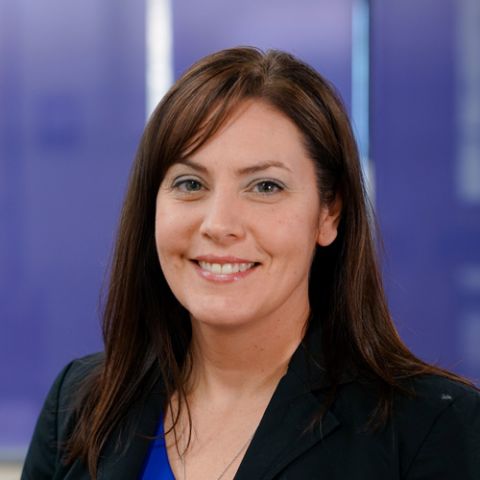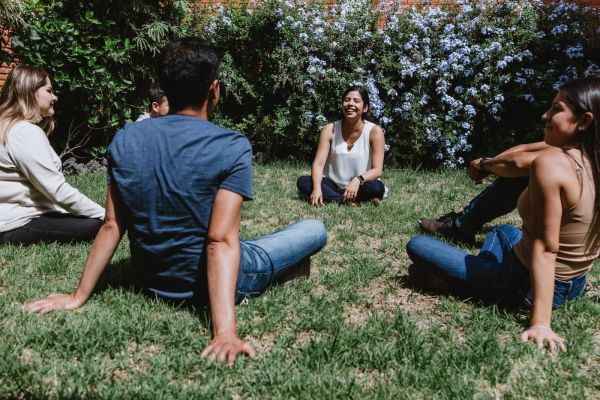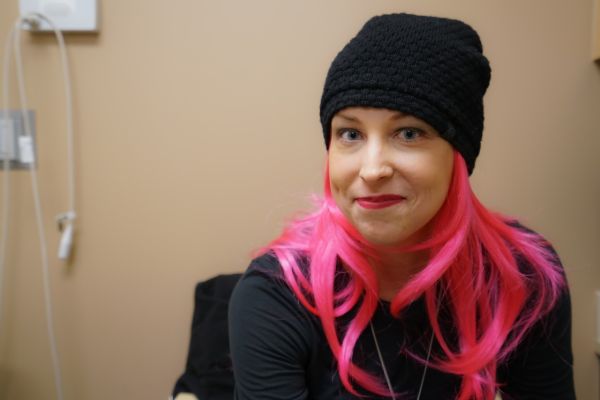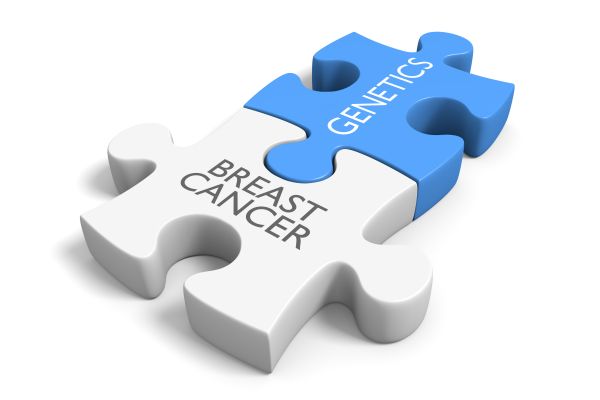The Beatles’ John Lennon once famously said, “Life is what happens to you while you're busy making other plans,” and the story of Andrea (Billittier) Weisansal’s last year and a half is a testament to that.
A Roswell Park employee becomes a patient
Andrea first began her journey with Roswell Park Comprehensive Cancer Center as an employee in late 2021. By New Year’s Eve 2022, the future looked bright as Andrea and her boyfriend Patrick celebrated their recent engagement and her new position at Roswell Park as a Clinical Research Coordinator with the Pediatric program.
But just weeks later, Andrea noticed a lump in her right breast while showering. Just like that, life changed. “Obviously there isn’t a good time to get cancer, but it was a really bad time for me to get it when I did. By nature, I am planner and organizer, and let me tell you, cancer is not for Type A control freaks because you can never be sure on any day how you will feel, if there will be major side effects or setbacks or when you can plan your wedding,” Andrea says.
Taking young adult cancer seriously
Even though she had no family history of cancer, Andrea knew she needed to get the lump checked right away. “My gynecologist immediately sent me for scans, followed by a mammogram, ultrasound and biopsy.” Andrea was diagnosed with stage 2B triple negative breast cancer, an aggressive type that is more common among women younger than 40. However, Andrea, then 30, didn’t have any of the other risk factors for triple negative breast cancer, such as being African American or Hispanic and/or having a BRCA1 gene mutation.
Most younger women with breast cancer are diagnosed with more advanced disease because they either ignore the signs or their doctor doesn’t believe it’s anything serious. In fact, while most cancer in the U.S. occurs in people age 65 and older, cancer is on the rise in younger patients – especially breast, endocrine and gastrointestinal cancers.
Planning for a future, a family and more
“When I told Patrick about my diagnosis, his first words were, ‘It’s going to be okay. We are going to get through this…together.’ From that moment, Patrick took charge of scheduling consults, speaking with the insurance company, contacting our wedding vendors and being my advocate when I was unable to advocate for myself. Before every appointment, Patrick would remind me, ‘What are we going to ask about today?’ because he knew I would forget in the moment.”
Treatment for triple negative breast cancer usually starts soon after diagnosis. “But, because both chemotherapy and radiation therapy could harm my eggs, I needed to decide whether I wanted to pursue fertility preservation, because the procedures would need to be done before I started treatment,” Andrea recalls. “Patrick and I definitely want to have children, so we were referred to Denise Rokitka, MD, MPH, who directs Roswell Park’s Oncofertility program and Young Adult program (and who also happens to be my colleague in Roswell Park’s Pediatric clinic).
"Dr. Rokitka and my care team discussed how long my treatment could be delayed while we pursued IVF testing and preparation, and they came up with a revised treatment schedule for me. Dr. Rokitka connected us with a trusted fertility clinic, where we learned that my body was at the exactly the right stage to prepare for egg harvest. We ended up completing the IVF process in two weeks, but not without some tears, stress, medications, hope, sickness from drugs to stimulate the development of eggs and then, two weeks later, joy. We learned that out of 25 matured follicles, 17 were fertilized and frozen for when the time is right,” Andrea says.
In February 2023, Andrea began her cancer treatment. Over 18 months, she received 4 biopsies, 16 rounds of intravenous chemotherapy, monthly injections of a hormone suppressor to protect her ovaries from the effects of chemotherapy, 20 rounds of radiation (under the direction of Simon Fung-Kee-Fung, MD, Director of Breast Radiation Service), a lumpectomy (performed by Surgical Oncologist Helen Cappuccino, MD, FACS), 8 cycles of oral chemotherapy, follow-up care with Chief of Breast Medicine Sheheryar Kabraji, BMBCh, and treatment at Roswell Park’s physical therapy and lymphedema clinics.
“For a while I was able to work every weekday except my chemotherapy day, and I was also able to teach dance at Moving Miracles, a dance program for individuals with developmental disabilities. Seeing my dance students each Monday and having Patrick and the incredible nurses by my side each Tuesday were lifelines for me,” Andrea says.
Young Adult program offers supportive community
Andrea and Patrick also discovered another lifeline: Roswell Park’s Young Adult program especially for patients in their 20s and 30s. The program offers services and support, aimed at the unique physical, emotional, social and practical challenges of a cancer diagnosis at this life stage. Services include fertility preservation consultations, mental health and financial counseling, social support and networking events, and connection to Roswell Park’s sexual health clinic and survivorship program.
“I dragged Patrick to a young adult happy hour at a local brewery,” Andrea says. “That night we heard Matthew Zachary, a young adult cancer survivor who started the @StupidCancer organization, encourage patients to advocate for themselves during treatment, but also to have fun and ‘get busy living.’ We soon became friends with others in the Young Adult program and participated in social events. It was so helpful for both of us to be with people in our age group, all at various stages of treatment, who understood what we were going through as both a patient and a caregiver.”
Andrea and Patrick were so impressed with the Young Adult program, they began fundraising for it. “Between our Super Bowl raffle, and the support of friends and co-workers on the ‘Andi’s Army’ Ride for Roswell team, we raised $11,500 for the Roswell Park Alliance Foundation, to help fund the program and cancer research. No young adult should ever feel alone while fighting for their life, and with this program, they don’t have to. This is where I found comfort and healing,” says Andrea.
Learn from and inspire others, listen to your body, advocate for yourself
Andrea also began following other triple negative breast cancer patients on social media for advice and community. One account in particular was the “aha” moment Andrea needed to get her through treatment because it radiated positivity and energy. “The light bulb went off. I could either be miserable with cancer or I could be joyful. Inspired, I began documenting my cancer journey in hopes that it would also help others.
“My type of cancer has a pretty high reoccurrence rate: 40% to be exact. But that also means there is a 60% chance that I will never go through this again. Learning how to switch negative thinking to a more positive kind is hard. It's something I'm actively working through. It's always going to be a work in progress.”
When Andrea had her first post-cancer mammogram, she received the good news: no evidence of disease. “I walked into the waiting room, where I saw Patrick and burst into tears!” Andrea recalls. Two months later, Andrea and Patrick at last had the wedding and honeymoon of their dreams, and in August, a day after taking her final oral chemotherapy pill, Andrea rang the Victory Bell at Roswell Park. “That morning, I woke up not as a cancer patient but as a cancer survivor!”
“I wish I could go back in time and give myself a hug and tell myself and others that you are so much stronger than you think you are. In the last 18 months, I have met some amazing people and have made lasting friendships. I have cried over my unknown future and learned to adjust to a new way of life. I’m still in therapy and working on some other issues, but I believe I can use my battle to help advocate for other young women. Cancer was hard, but it’s taught me to appreciate life.”
Editor’s Note: Cancer patient outcomes and experiences may vary, even for those with the same type of cancer. An individual patient’s story should not be used as a prediction of how another patient will respond to treatment. Roswell Park is transparent about the survival rates of our patients as compared to national standards, and provides this information, when available, within the cancer type sections of this website.




